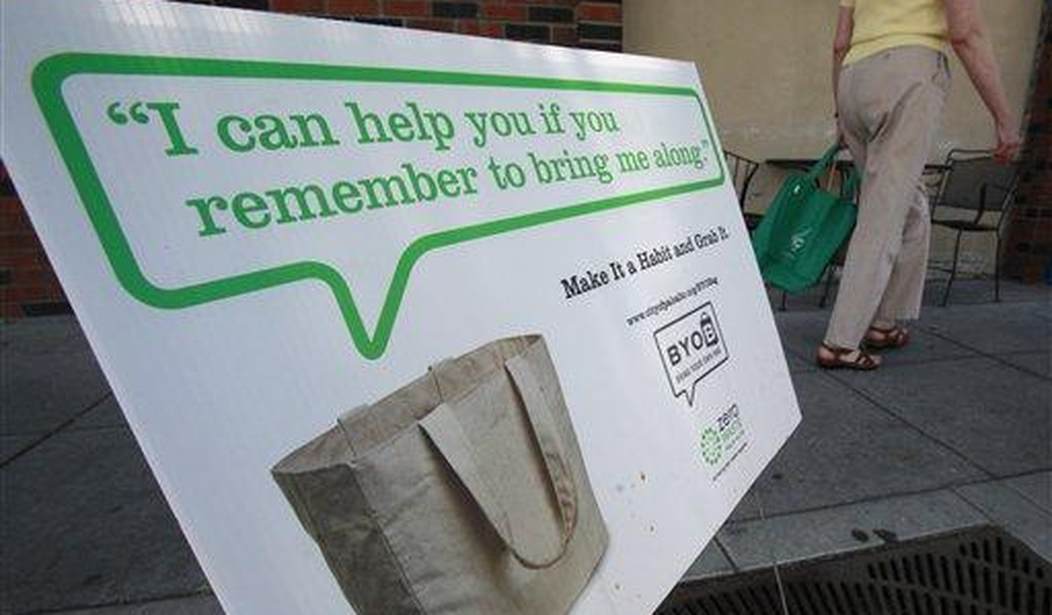For five years, California state Sen. Alex Padilla has been pushing a bill to ban grocers and large retailers from giving away single-use plastic bags. In May, he came close; his SB 405 fell 3 votes short of the 21 needed to pass in the state Senate. On Thursday, Padilla announced that he will try again in January. "I am convinced that a statewide policy is only a matter of time," quoth Padilla in a statement.
He's probably right. When Sacramento scolds decide that they've got the right to tell law-abiding taxpayers what they cannot do -- for their own good -- there's no stopping that train.
In 2007, San Francisco became the first city in America to prohibit grocers from giving away single-use plastic bags. Then-Supervisor Ross Mirkarimi boasted that his "first-in-the-nation" ban would spark similar legislation. In 2012, Ess Eff's plastic bag ban expanded to apply to all retailers. In October, the Special City's nanny bag law required restaurants to charge a dime for each paper takeout and delivery bag.
Politicians in search of easy headlines followed Mirkarimi's lead. Other cities -- including San Jose and Los Angeles -- passed their own bans.
A statewide bill by Assemblyman Marc Levine won the support of the California Grocers Association, as it promised "uniformity of experience" for shoppers and, more importantly, big retailers, which would have gotten to keep the bag fee.
It never ceases to amaze me how willingly Californians agree to be treated like sheep. Liberals are supposed to believe in choice -- but lawmakers happily abandon that mantra when they spy an opportunity to tell working people and shoppers what they cannot do.
Recommended
In Sacramento, they don't even have to establish the need for their nanny laws, the science behind their nanny laws or the economics behind their nanny laws. The left has tapped into the guilt Americans feel for consuming groceries, clothes, stupid purchases. With the ban on bags, politicians have become the new priests. Their message: You can buy tons of crap -- but you have to atone by putting your purchases into sackcloth.
Do I exaggerate? Consider that Padilla's SB 405 exempted food stamp recipients because, he told me in April, he feared a bag ban would have a negative "impact on low-income families." As if their bags are different.
"It's a backlash against the consumption society," Sterling Burnett, senior fellow of the National Center for Policy Analysis. Burnett examined six cities, including San Francisco, that had banned the free distribution of single-use plastic bags, only to find no proof that the bans save cities money as sponsors promised.
Plastic bags account for such a small amount of landfill -- less than 1 percent -- he explained, that banning these flimsy receptacles doesn't really change a city's waste stream. The problem with bag banners is, Burnett added, "you only talk about the benefits of getting rid of it. You ignore the costs of the other option."
The other option is reusable bags. A 2011 U.K. Environment Agency study found that reusable cloth bags have to be used more than 131 times to have less of a greenhouse gas impact than once-used high-density polyethylene bags.
Now you see reusable bags everywhere. When my county's ban began, I had one reusable bag. Now I cannot count all the cloth bags I have stashed at work, in my car and at home. They don't look all that healthy, so I doubt I'll reuse them more than 100 times.
At least I know enough to wash reusable bags. Most consumers do not wash their sacks in hot water; they risk putting their groceries in a germ incubator.
To sum up: Single-use bag bans don't really reduce greenhouse gases; they encourage the use of cloth bags that can be hazardous to your health; and if you choose to opt out because it's healthier and more convenient, you get nickeled and dimed when you go shopping. City politicians love to come up with taxes that are supposed to discourage what they consider to be bad behavior -- buying Happy Meals, drinking soda, maybe, and, it seems, spending money in San Francisco stores.
Mayor Ed Lee once defended the city's bag ban: "The intent was never to nickel or dime anybody. But if it takes 10 cents to remind somebody that their habits are in their control, I think that's something we're willing to consider doing."
Amazing. In that spirit, I recommend charging the mayor a dime for every mile he travels during one of his many greenhouse gas-emitting trade trips to China. I guess it's OK to shop in China.























Join the conversation as a VIP Member